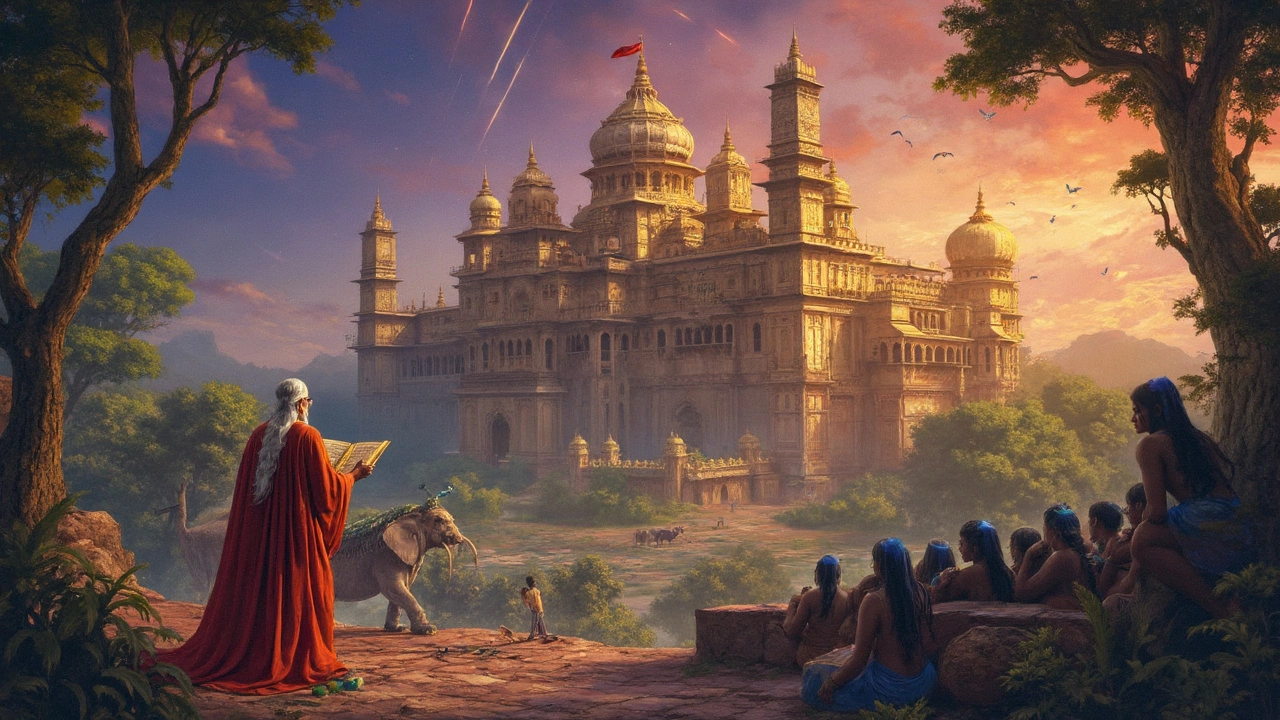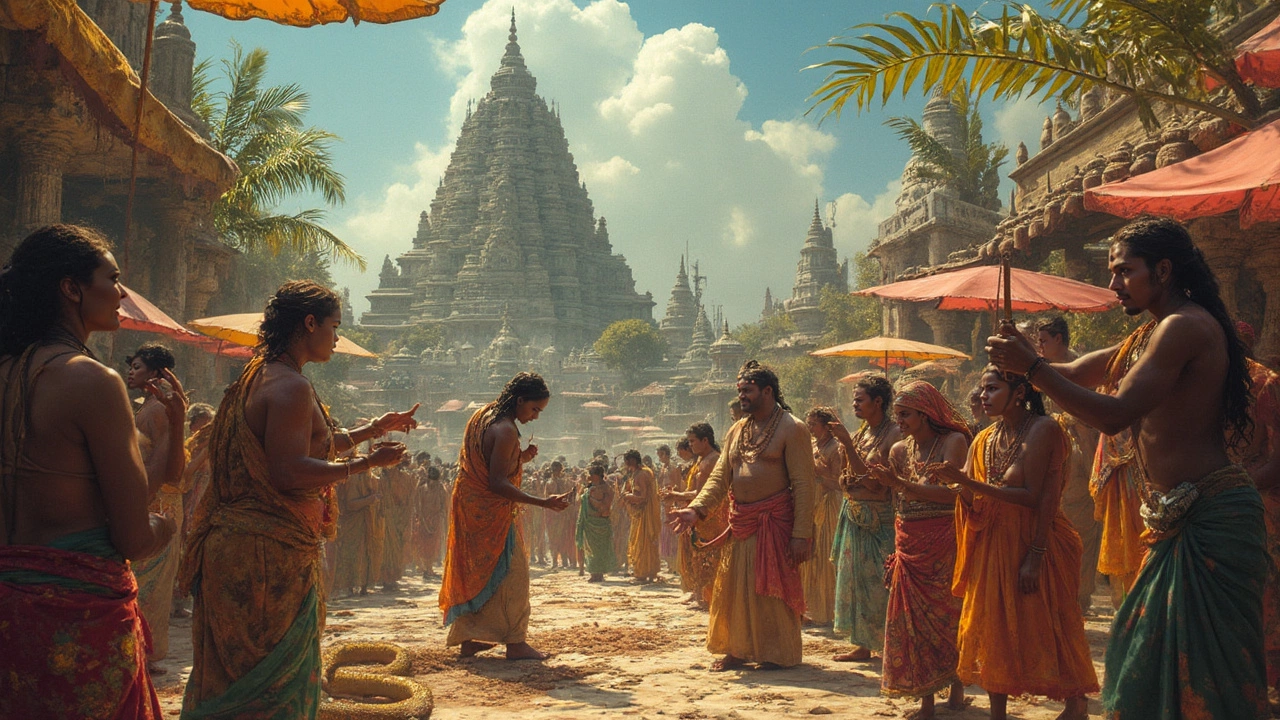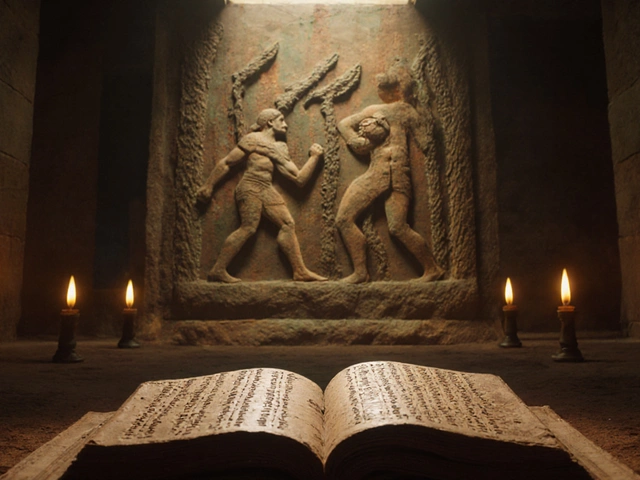
Ever wondered why myths have such an enduring presence in our lives? Mythical stories are more than just tales of gods and magic—they're the building blocks of some of the world's oldest cultures, packed with lessons that still resonate today. At their core, these stories are fictional narratives that delve into the human experience using supernatural elements. From the adventures of Hercules to the creation myths of various cultures, these tales offer rich storytelling that connects us to our roots.
Interestingly, mythical stories are a window into understanding the values and beliefs of ancient societies. They weren't just spun out of thin air; they reflected the fears, hopes, and ethics of civilizations long gone. Ever heard of the Greek myth of Icarus? It's more than just a boy who flew too close to the sun—it's a lesson about hubris and ambition. Such stories are not just entertaining; they convey deep-seated truths that remain relevant.
So what does all this mean for modern readers and writers? Well, myths are ripe for reinterpretation. They've inspired countless books, movies, and TV shows, bringing age-old tales into contemporary settings. If you're thinking about writing your own mythological fiction, start by tapping into the rich vein of cultural lore. Remember, the key is to blend fantastical elements with themes that speak to modern audiences.
- Understanding Mythical Stories
- The Role of Culture and History
- Modern Reinterpretations
- Tips for Writing Mythological Fiction
Understanding Mythical Stories
So, what exactly are mythical stories? In simple terms, they're narratives featuring supernatural beings or events, handed down through generations. They weren't just idle tales—they were often used to explain the world around ancient people. You know, like why the sun rises and sets or why seasons change.
Take the myth of Persephone, the Greek goddess abducted by Hades, which explains the cycles of the seasons. Through stories like these, cultures made sense of the natural environment and life's mysteries. The word "myth" itself comes from the Greek word "mythos," meaning story or speech, highlighting its role as a storytelling tradition.
The Elements of Mythical Stories
Mythical stories usually feature certain elements: gods, deities, and heroes. They often involve moral dilemmas or power struggles. One fascinating bit is how these stories blend reality with the magical. Ever heard of Thor, the Norse god? His hammer and thunder are legendary because they tie into real weather phenomena, making the story relatable yet fantastical.
"Myths are public dreams, dreams are private myths." - Joseph Campbell
This quote nails it. Myths function much like our dreams—giving form to our biggest hopes and fears. But they do it for the collective psyche, not just for individuals. That’s what makes them a cultural treasure.
The Influence of Ancient Cultures
Mythical stories are rooted deeply in the cultures from which they originate. While some themes are universal, like good vs. evil, others are tied to specific cultural beliefs. For example, Norse myths have a lot of apocalyptic themes, while many Indian myths explore the concept of reincarnation.
You might wonder how these tales have survived? Oral tradition played a big part, long before written language was widespread. People passed down stories by storytelling gatherings, ensuring they morphed and survived through the ages.
If you're diving into mythological fiction, it's crucial to understand these stories' building blocks and cultural backgrounds. It’s about keeping a balance—maintaining the essence of myths while making them resonate with today’s readers. That's the magic of mythical stories.
The Role of Culture and History
When we talk about mythical stories, we're essentially diving into the heart of ancient cultures and their histories. These stories didn't just pop out of nowhere; they were crafted from the fabric of everyday life, societal norms, and historical events of the time. They speak volumes about the people who told them and the times they lived in.
Take Greek mythology, for instance. Ancient Greek myths weren't just about gods with thunderbolts or epic quests—they were reflections of Greek society's values, such as honor, bravery, and the importance of hospitality. These tales were a way for people to explain the natural world around them, from the change of seasons to the anger of the seas.
The Egyptian Connection
Similarly, mythological stories from ancient Egypt often centered around gods like Ra and Osiris, reflecting the Egyptians' fascination with the afterlife and the cycles of nature. These myths formed a huge part of their religion and daily life, influencing everything from politics to architecture.
Impact of Folklore
Let's not overlook how folklore from various cultures has added layers to the fabric of mythological fiction. Folktales often carry localized truths and morals, echoing the smaller, everyday experiences of a community as opposed to the grand epics of gods and heroes.
| Culture | Key Themes |
|---|---|
| Greek | Heroism, divine justice, fate |
| Egyptian | Death and rebirth, cosmic order |
| Norse | Bravery, apocalypse, vengeance |
All in all, the role of culture and history in crafting these tales was about much more than mere entertainment. These stories recorded historical events, passed down important traditions, and helped to guide the moral compass of their readers. Understanding this context helps us appreciate mythological fiction's depth and richness.

Modern Reinterpretations
Mythical stories have undergone a cool transformation in recent years, keeping them alive and kicking in today's pop culture. Thanks to this ever-evolving world of storytelling, we see these ancient tales getting a fresh coat of paint in a variety of media.
In Books and Movies
One of the most popular modern reinterpretations of mythological fiction is Rick Riordan's 'Percy Jackson' series. By taking classic Greek mythology and setting it in the modern-day U.S., Riordan created a fun and accessible way for younger generations to engage with these age-old stories. The success of the books even led to movie adaptations, further proving the timeless appeal of mythical narratives.
Another great example includes Marvel's take on Norse mythology with characters like Thor and Loki. While they started as comic book heroes, these characters have leapt off the page into blockbuster movies, turning them into household names and highlighting how fluid myths can be.
On TV Screens
TV shows have also played a significant role in bringing mythical stories to life. Shows like 'American Gods,' based on Neil Gaiman's novel, weave elements of various mythologies into the modern world, creating a gritty and engaging narrative that explores the place of these legendary beings in today's society.
Why Do Modern Reinterpretations Work?
What's interesting is how myths offer a rich tapestry to draw from, making them ripe for reimagining. Who can resist a good story where ancient gods walk among ordinary people? This blending of old and new makes for great storytelling with layers of complexity and familiarity that audiences love.
Getting Your Feet Wet
If you're keen on riding this wave and writing your own myth-inspired tale, consider a few things. First, know your source material well—whether it’s Greek, Roman, or something more obscure. Then, think about what modern twist you can add to make it relatable. Will you set it in a bustling city or on a remote island? Remember, strong characters and an engaging storyline are key!
By understanding how mythical stories have been reinterpreted, you can appreciate their lasting impact and potential to inspire. Whether you're a reader, writer, or just a curious soul, there's a world of mythological fiction waiting to be explored.
Tips for Writing Mythological Fiction
Thinking about diving into the world of mythological fiction? Here's a heads-up: these stories aren't just crafted for entertainment. They carry the weight of centuries of culture and tradition. Let’s break down some key tips that might just spark your creative journey.
1. Research Is Key
Before putting pen to paper, immerse yourself in existing myths. Understand the plots, characters, and motifs. Why? Because a well-rounded understanding lets you add layers to your story. Whether it's the Greek myth of Persephone or the Norse tales of gods, there's always more to learn.
2. Create a Modern Twist
The best mythical stories often bring something new to the table. Don’t just retell a classic tale. Look for ways to make it relevant to modern times. Think about how Rick Riordan reimagined ancient myths in a way that appeals to young readers today, like Percy Jackson's adventures.
3. Build a Rich World
Mythological settings are grand and filled with magic, but they still need to feel real. Crafting a believable universe—where gods, heroes, and mortals coexist—is essential. Make sure your readers can visualize your world by describing its rules, landscapes, and history.
4. Embrace Archetypes
Myths thrive on archetypes—the hero, the trickster, the wise mentor. Use them to your advantage but don't be afraid to break the mold. Mix things up by adding depth to these characters, giving them unique backstories or surprising qualities.
5. Ensure Cultural Respect
With great power comes great responsibility. When weaving mythical tales, respect the source material. Ensure that the culture you're drawing from is represented appropriately and with sensitivity. It’s crucial in honoring the heritage from which these stories emerge.
Have a look at how popular myths have been retold over time. You'll find that even though the core remains the same, the presentation evolves, keeping audiences hooked across generations.


